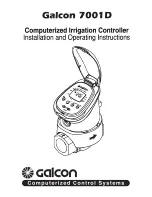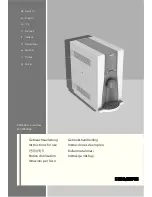
SECTION 3
Pool Preparation
3A Important Information
If the TrioPure
TM
is being installed on a new pool, do not add
salt for 2 weeks after pool has been filled to help protect
plaster from staining.
Pool water must be at the proper salinity level, temperature,
and chemically balanced before operating the TrioPure
TM
.
3B What Kind of Salt to Use
Use 99.6% pure or better sodium chloride water softening or
feed salt work best with your TrioPure
TM
. The finer the grain,
the easier it will be to dissolve the salt quickly and completely
(pellets are much harder to dissolve than fine grain salt).
Common brand names of salt to use are Cargil and Morton.
Note:
Salt with anti-caking agents (yellow prussiate of soda,
or “YPS”) may cause staining of pool linings and fixtures and
should not be used.
3C Where to Get Salt
Salt can be purchased at a pool supply, building supply, feed
supply, or major home and garden department store.
3D How Much Salt to Use
Always use a salinity test strip (such as Aquacheck White for
salt or LaMotte Tracer Meter- found through local pool supply
dealer) or digital salinity meter to determine salt level in pool
water prior to adding any salt. Capture water from about 457mm
(18” in.) deep in a container, and then test this water sample. Add
enough salt to obtain a salinity of approximately 3,500 ppm - Refer
to
‘Salt Sizing Table’
(Figure 14) on pages 11-12.
3E How to Add Salt
Step 1 - Evenly disperse the proper amount of salt around the
perimeter of the pool. Run the main pool circulation pump for
24 hours and agitate any undissolved salt deposited at the
bottom of the pool with a pool brush. Allow 24 hours or longer
for salt to fully dissolve.
IMPORTANT:
To avoid damage to your TrioPure
TM
chlorinator,
never operate the TrioPure
TM
if the salinity level is under 3,000
ppm.
It is easy to add more salt to your pool but difficult to remove
excess salt through draining.
CAUTION:
Do not add salt to the skimmer box.
3F Pool Sizing Chart
If you don’t know the size of your swimming pool, you must first
determine the volume before adding large quantities of salt.
For rectangular pools, simply calculate:
length (m) x width (m) x average depth (m) =
cubic meters (m
3
)
For oval pools, simply calculate:
length (m) x width (m) x average depth (m) x 1.1 =
cubic meters (m
3
)
For round pools, simply calculate:
(diameter(m))2 x average depth (m) x 1.3 =
cubic meters (m
3
)
width
length
average
depth
length
average
depth
width
Rectangular Pool
Oval Pool
Figure 12
Figure 13
10
TrioPure
TM
Sanitation System
DEL Ozone · San Luis Obispo, CA 93401 · USA · 800-676-1335 · Fax: 805-541-8459
Summary of Contents for TrioPure 25
Page 30: ......
















































